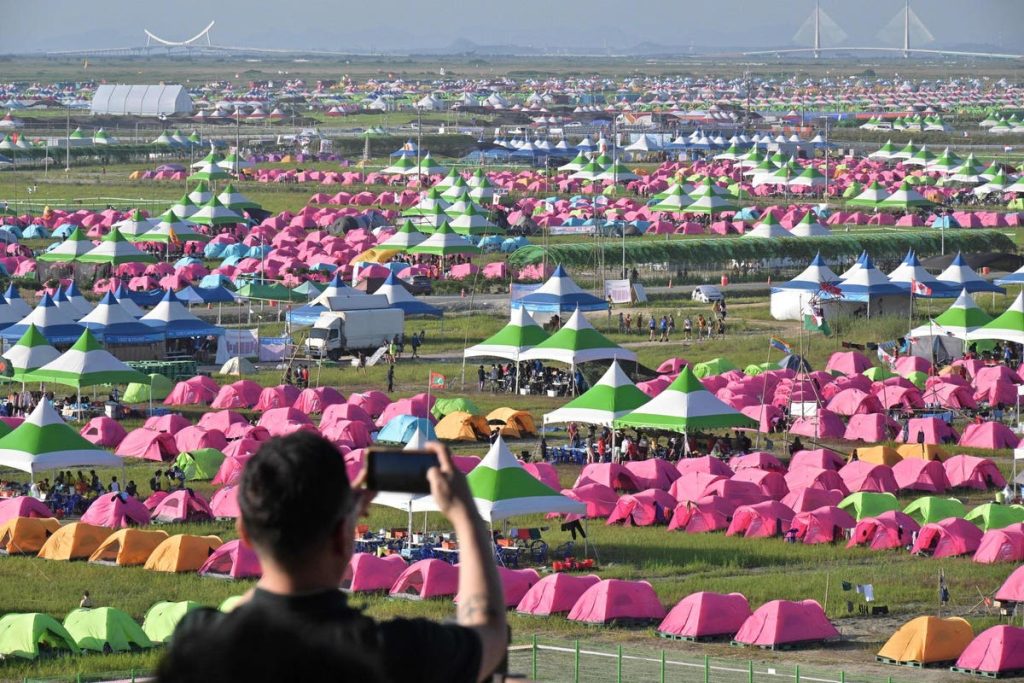Over 43,000 youth, leaders, and volunteers converged in SaeManGeum in South Korea this week for the 2023 World Scout Jamboree. Held at a different site every four years and hosted this year by the Korean Scout Association, this year’s event has been plagued by problems, leading to the withdrawal of British and American contingents beginning just four days into the event. [Full disclosure: the author is the parent of a member of the 2023 World Scout Jamboree – USA Contingent.]
Extreme heat prompted at least 100 participants to be treated for heat-related illness and the President of South Korea Yoon Suk Yeol to call for an “unlimited supply” of buses and trucks to provide needed air conditioning and chilled water.
The USA Contingent recognized problems with the site early on and partnered with the U.S. Army Garrison Humphreys to house Scouts on August 1st, the first scheduled day of the Jamboree. Scouts spent the night in a school gymnasium while eating military Meals Ready to Eat (MREs) before being bussed to the Jamboree site on Wednesday.
Once there the problems continued. The 36-Scout USA Contingent Troop 2 from the Mid-Atlantic arrived to the Jamboree to find their planned tents and other necessary gear had not been provided, and spent the first night on the floor and in plastic chairs in a headquarters tent. Parents from other troops commented on social media that there was no food provided to their children the first night.
In an emergency meeting with parents Saturday morning, President, CEO, and 14th Chief Scout Executive of the Boy Scouts of America Roger Mosby announced that the decision to pull the USA Contingent from the Jamboree site and return to Camp Humphreys was more about sanitary conditions than heat or rain. BSA International Commissioner Lou Poulson noted that “the decision didn’t come lightly or easily. We spent extensive time with the U.S. Embassy and Consul General” and it came down to there being no choice.
Along with the USA Contingent’s medical director Dr. Jeff Myers, Poulson highlighted the reasons for the USA Contingent’s departure:
· Oppressive heat. While shade is being brought it, it is “too little, too late, and heat is the foundation of what drives other things.”
· Food supply. There have been problems with proper food storage and the number of calories provided to participants. Whie food supply has improved, it is not enough to alleviate concerns that can result from heat stress and low calorie intake.
· Sanitation. Poulson described “terrible, deplorable conditions,” to include uncleaned toilets, showers with fecal matter, and the risk of health issues that could result. He added, “if this site were in the U.S., it would be declared a health emergency.” Organizers previously announced that cleaning staff were increased from 70 for the entire 40,000-person site to more than 500.
· Youth protection concerns. Insufficient shower facilities were causing youth and adults to share shower facilities, in violation of BSA’s Youth Protection Policy. The BSA emerged from bankruptcy this spring to pay $2.4 billion to sex abuse survivors.
· Weather. Oppressive heat is not the only weather risk. Bands of a typhoon are expected to hit the site soon, and torrential rain is expected starting Sunday. While ditches have been dug to channel runoff, USA Contingent leadership does not believe the site will be able to handle the rainfall.
· Medical facilities. Host country planners expected 500 patients per day but have seen between 5,000 and 10,000 patients per day. Isolation for participants diagnosed with covid were not initially available, and there were no provisions for testing of influenza. Further, referrals to orthopedic and other necessary specialists are not being made, and the organization has unable to track U.S. citizens who were sent to local hospitals for treatment beyond what the Jamboree medical tent can provide.
While their responsibility is the safety of American participants, USA Contingent leaders added that they feel the health and safety of all participants is at great risk. Families entrusted their children to USA Contingent leadership, and it is their duty to honor that trust and keep those children safe. And the USA Contingent has the benefit of a large, modern military presence in the Republic of Korea.
American Scouts will be bussed to Camp Humphreys on Sunday, August 6th to continue their South Korean visit until most depart next Saturday, August 12th. They will once again sleep on cots in air-conditions elementary and middle school gymnasiums, with hot meals provided in the morning and evenings, and bagged lunches during daytime excursions.
Brad Valdyke, Head of the USA Contingent, described program activities being planned in conjunction with the American community at Camp Humphreys and the BSA Far East Council. Sunday night will include a “glow party” while watching a live-streamed KPop concert, followed by groups exploring entertainment events like Legoland Korea on Monday. A professional baseball game is being planned for Tuesday, with cultural events duplicating much of the Jamboree program, such as calligraphy and games on the base on Wednesday. Scouts will have the opportunity to explore the local community on Thursday, and movies, bowling, and other entertainment activities will be offered throughout.
It was determined to be too risky to have participants on the site for any period of time, so Scouts will not be bussed in for closing ceremonies or any other activities. While the possibility of an early departure was considered, the logistics of moving almost a thousand U.S. Scouts and leaders from 14 hubs, as dispersed as Germany and Puerto Rico, were determined to be insurmountable, and the departure will remain as scheduled. Requests for charging facilities and wifi were made, with promises to address these concerns.
Valdyke mentioned that leaders were looking into trying to offer opportunities for American Scouts to get together with other Korean Scout organizations, and that contingents from other countries were asking for help to leave the Jamboree site as well. The USA Contingent was able to make transportation arrangements that were unavailable to other contingents, having contracted for a separate bus transportation company during initial planning. Furthermore, the World Order of the Scout Movement asked organizers to “consider alternative options to end the event earlier than scheduled and support the participants until they depart for their home countries.”
BSA National Commissioner W. Scott Sorrels encouraged attendees to challenge themselves as Scout leaders and parents. “Sometimes we as adults need to make a risk assessment, and make sure we make the right decision.” He further emphasized that Jamborees only happen because volunteer leaders come from around the world at their own expense, taking time away from work and family, and deserve support. Appreciation was also provided to the U.S. Army and Department of State for their swift action and assistance in moving the USA Contingent to Camp Humphreys, providing a safe and enriching experience for all.
This is not the first World Scout Jamboree to experience significant weather-related challenges. The 1971 World Scout Jamboree was visited by Typhoon Olive, forcing participants to evacuate to shelter for two days. Like the 1971 WSJ participants, 2023 WSJ attendees are learning how to innovate in crisis, are creating bonds forged in adversity, and experiencing what will become the subject of many stories and quite possibly, college application essays in the years to come.
The conversation has been edited and condensed for clarity. Check out my other columns here.
Read the full article here










